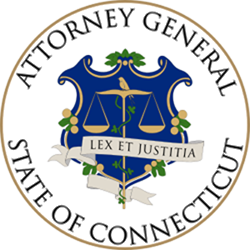Press Releases

07/31/2020
AG Tong Demands Answers From Eversource Following Rate Hikes
(Hartford, CT) – Attorney General William Tong is demanding answers from Eversource regarding a delivery charge hike that has contributed in part to major increases in consumer bills. Formal interrogatories were served Thursday as part of a Public Utilities Regulatory Authority’s proceeding in which the Eversource delivery fee increase is being investigated and reconsidered. The interrogatories seek to understand the costs contributing to the increase, additional factors that may impact rates going forward, and possible changes that could be made by regulators or the legislature to lower rates for consumers, among other questions. The Attorney General is demanding that Eversource explain how they calculate their delivery charges and why the delivery charges are higher.
“We’ve received complaints from well over 100 consumers regarding unaffordable increases in their energy bills. Consumers have a right to be angry. We pay far too much for our energy as it is here in Connecticut. I thank PURA for reconsidering and scrutinizing these increases, and for considering all possible avenues to assist consumers. This office has intervened on behalf of consumers at each and every rate case before PURA and FERC because we know how much the cost of energy impacts family budgets,” said Attorney General Tong.
Interrogatories include:
1. Describe how the costs of the power purchase agreement for the Millstone Nuclear Power Station assessed to consumers through the Non-Bypassable Federally Mandated Congestion Charge (“NBFMCC”) are determined.
2. Describe all factors that led Eversource to increase the weighted average NBFMCC rate effective July 1, 2020.
3. Describe how conditions in the energy market may affect the costs of the power purchase agreement for the Millstone Nuclear Power Station assessed to consumers through the NBFMCC.
4. State how long Connecticut consumers will be assessed costs for the power purchase agreement for the Millstone Nuclear Power Station. Explain whether Connecticut consumers can expect those costs to rise or fall during this time.
5. Describe the total amount of costs to be recovered from consumers for 2020 as a result of the power purchase agreement for the Millstone Nuclear Power Station.
6. Describe how often Eversource adjusts the percentage of costs assessed to customers as a result of the power purchase agreement for the Millstone Nuclear Power Station.
7. Describe the customer impact of deferring your recovery of costs for the power purchase agreement for the Millstone Nuclear Power Station.
8. Describe all factors that contributed to the increase in the Transmission Adjustment Clause (“TAC”) effective on July 1, 2020.
9. Describe all factors that contributed to the increase in the Electric System Improvements Tracker Charge effective on July 1, 2020.
10. Compare both residential and non-residential customer usage in May through June 2020 as compared to May through June 2019. Describe the factors that led to any changes in usage patterns.
11. Provide in terms of both dollars and percentages of average (700 kWh/Mo.) residential electric bill the impact of uncollectibles for June 2018, 2019 and 2020. Please provide actual or estimated deferred revenues resulting from additional uncollectibles since March 2020, as well as costs related to the Docket No. 20-03-15 – Emergency Petition of William Tong, Attorney General for the State of Connecticut for a Proceeding to Establish a State of Emergency Utility Shut-off Moratorium. Please provide similar calculations in dollar amounts and as a percentage of average residential bills that includes the impacts of estimated additional uncollectibles resulting from this moratorium and the ongoing public health crisis resulting from Coronavirus.
12. Describe any other factors, not addressed above, that will or may impact rates charged to consumers in the next five years, including the nature of, expected impact of and reasons for each such factor.
13. Describe any changes by you, PURA, the legislature, ISO New England or FERC that could result in lower electric rates for consumers, and describe the term over which you would expect those changes to take effect and the impact you would expect.
***
There are three components that make up your energy bill—how much you use, the cost of the energy itself, and the cost of delivering that energy to you. Effective July 1, the amount that Eversource charges for the energy itself (their standard service rate) decreased by about 2 cents per kWh. For an average consumer consuming 700 kWhs a month, that’s about $14 less per month on their bill. But there were two substantial increases to the delivery charge authorized by the Federal Energy Regulatory Commission (FERC) and by the Connecticut Public Utilities Authority (PURA). The first was a federally mandated transmission charge that increased from 2.601 to 3.785 cents per kWh, amounting to $8.29 more per month for the average customer. The second was a legislatively mandated charge to support carbon free generation to help the state meet its regional greenhouse gas emissions standards that amounts to a $10.24 monthly increase for the average consumer. Those three adjustments taken together amount to an average of $5.80 more per month for the average consumer, according to Eversource. That is on top of the additional consumption we are seeing as a result of more people spending more time at home running air conditioners, computers, and other electronics. On Thursday, Attorney General Tong joined U.S. Senator Richard Blumenthal in urging FERC to rescind the transmission charge increase and rebate consumers for what has already been paid for this past year.
Assistant Attorneys General Lauren Bidra, John Wright and Consumer Protection Department Head Michael Wertheimer are assisting the Attorney General in this matter.
###
- Twitter: @AGWilliamTong
- Facebook: CT Attorney General
Media Contact:
Elizabeth Benton
elizabeth.benton@ct.gov
Consumer Inquiries:
860-808-5318
attorney.general@ct.gov


